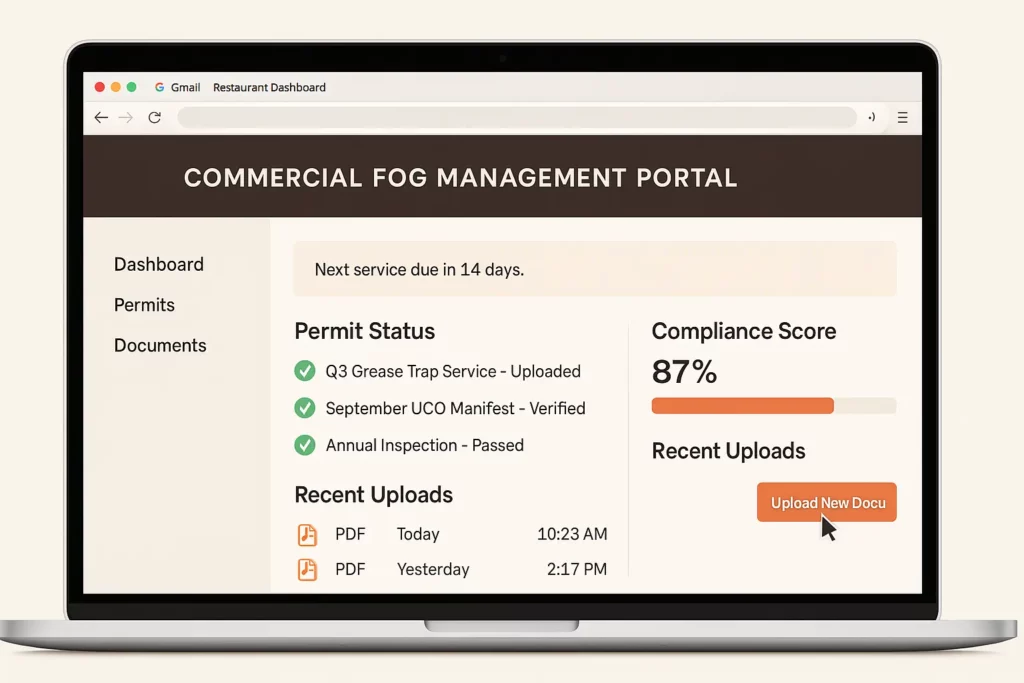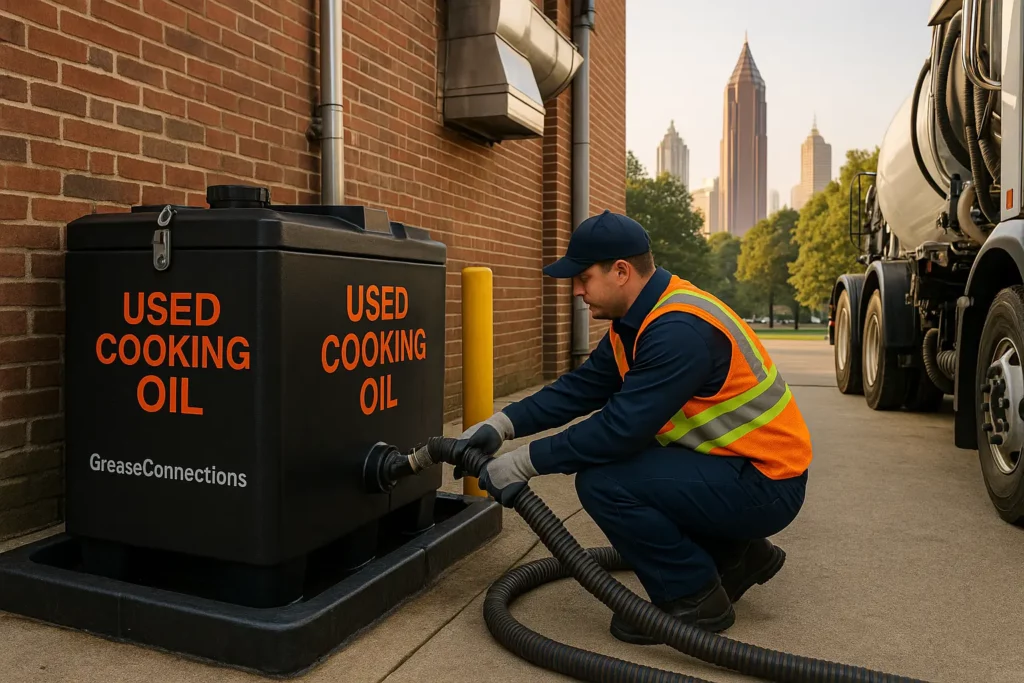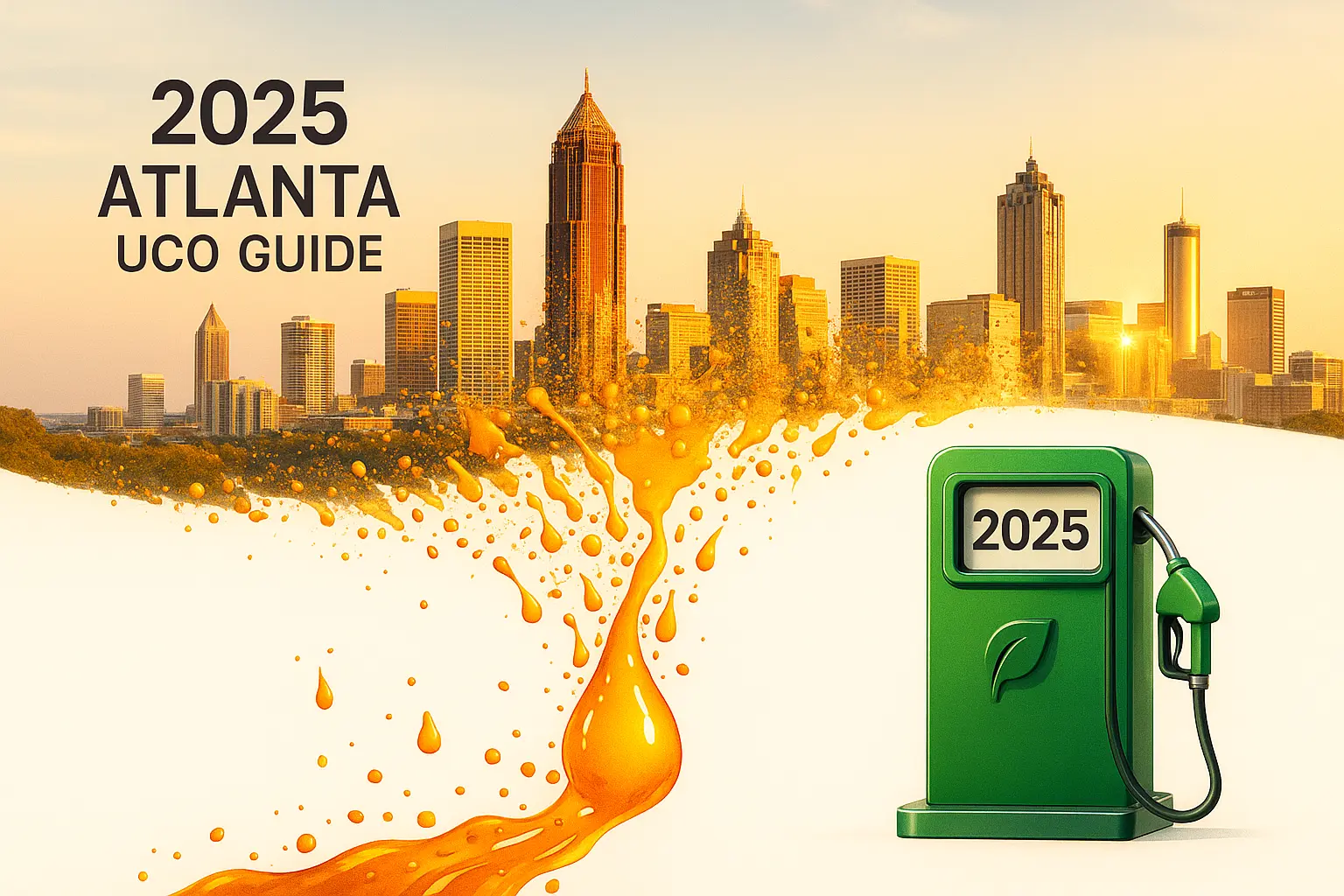Last updated 6/29/2025*
Table of Contents
Why This Guide Matters In Atlanta
Restaurants across Metro Atlanta pour an estimated 12 million gallons of fryer oil a year, enough to fill 18 Olympic pools, and its value keeps rising as the global UCO market heads toward $12.46 billion by 2032. Locally, clean oil fetches about $3 per gallon in today’s spot market, meaning a single 35 pound jug is worth more than a plate of wings. Yet FOG clogged sewers still cost Fulton County over $1 million annually in emergency cleanouts, driving tighter enforcement of storage and pickup rules. This guide distills every regulation, safety step, and profit lever your kitchen needs to turn waste into predictable revenue while avoiding fines.
Understanding Your Oil’s Journey
Used cooking oil (UCO) passes through five milestones: fryer drain, in kitchen transfer, outdoor containment, scheduled pickup, and refinery conversion. Miss one step and you risk slips, stings, or citations under Atlanta Code Section 154-297.03, which requires proactive FOG control and documentation. Mahoney’s national guide stresses safe transfer equipment but glosses over local permitting, while Dar Pro markets “no contracts” yet omits refinery traceability. In contrast, Fulton’s new online portal verifies every gallon you recycle before renewing your food service permit. Knowing each checkpoint protects staff, pipes, and profit.
Local Laws & Permits You Can’t Ignore
Fulton County’s Commercial Pretreatment Division now mandates digital FOG permits, quarterly grease trap logs, and service receipts uploaded within 14 days of pickup. City of Atlanta Chapter 154, Article V backs those rules with fines up to $1,000 per day for overflows and record keeping gaps. Neighboring counties often mirror Atlanta’s code, so compliance in Buckhead covers you in Sandy Springs too. Mahoney and Dar Pro instruct clients to “keep paperwork on site,” but the portal’s real time dashboard replaces binders and slashes audit time by 60 percent. Bookmark it, upload every Grease Connections manifest, and watch inspectors breeze through.

Safe Handling & Storage Best Practices
Spilled oil accounts for 27 percent of commercial kitchen injuries, yet most come from manual bucket transfers. Switch to closed loop caddies that pump directly into a lidded 240 gallon tank; Atlanta inspectors accept only lockable, weather resistant containers positioned on an impermeable pad at least three feet from storm drains. Add a quick connect valve so drivers empty tanks without opening lids, stopping odor complaints and theft. Train staff to cool oil to 140 °F before transfer and to wipe spills with absorbent pads, not hoses, to meet Georgia fire safety rule 120-3-3.

Grease Trap Math Made Simple
| Seating Capacity | Required Trap (gal) | Pump Out Interval (weeks) | Min. UCO Tank Size |
|---|---|---|---|
| 0-50 seats | 50 | 8 | 55 gal drum |
| 51-150 seats | 75 | 6 | 140 gal cart |
| 151-300 seats | 100 | 4 | 240 gal tank |
Atlanta applies a 2 gallon per seat formula and demands pump outs when solids reach 25 percent of capacity. Grease Connections schedules traps and oil pickups together, cutting site visits in half and leaving you with one line on the manifest instead of two.
Choosing A Recycling Partner
| What Matters | GreaseConnections | Mahoney | Dar Pro |
|---|---|---|---|
| Local FOG permit uploads | ✔ same day | ✖ client upload | ✖ client upload |
| Average rebate paid (¢/gal) | 80 | 50 | 55 |
| Atlanta based fleet | ✔ | ✖ | ✔ |
| Live tank level sensors | ✔ | ✖ | ✖ |
Mahoney’s national footprint is strong, but local fleets are thin in the Southeast. Dar Pro offers fast pickups yet no sensor data. Grease Connections Atlanta drivers close 98 percent of routes within 48 hours and feed IoT readings straight into the Fulton portal, keeping your compliance clock on autopilot.
Rebate Reality: Turn Grease Into Cash
With spot prices near $3/gal and rebates averaging $0.65/gal, a midsize Buckhead bistro dumping 200 gal/month nets $130 every 30 days. Volume surges during football season? Schedule on demand pickups and earn incremental checks instead of overflow fees. Stay under 40 gal and most haulers charge service fees, but Grease Connections waives them if annual volume exceeds 400 gal, aligning with EPA’s biodiesel push toward 24.02 billion blended gallons by 2026. Doubling your fryer capacity could finance a new combi oven by year’s end, oil truly pays for upgrades.
Sustainability & The Biofuel Boom
Every gallon of kitchen oil diverted to biodiesel saves 0.79 kg CO2, roughly the emissions of driving three miles in an average sedan. Atlanta’s restaurants collectively offset more than 26,000 metric tons last year, equivalent to planting 430,000 trees. Federal RIN incentives now favor domestically sourced feedstock, pushing Southeast collectors to the front of the supply line and boosting local rebate power. By locking in a recycling contract before Q4, you ride the mandate wave instead of chasing price spikes.
Quick FAQs
What size grease trap does a 75 seat café need? Atlanta code calls for a 75 gallon interceptor, pumped at least every six weeks.
Do I have to log pickups? Yes, Fulton County’s portal requires uploads within 14 days or you risk fines.
How much is my oil worth today? Around $3 per gallon, though rebates vary with purity and volume.
Can I use my old tank? Only if it seals, locks, and sits on an impermeable pad; otherwise swap it to pass inspection.
Will recycling cut my carbon footprint? Each gallon keeps 0.79 kg CO2 out of the air, track it on your monthly manifest.
Ready To Upgrade Your Grease Game?
Book a same week site survey anywhere in Fulton County. We’ll size your trap, install a locked tank, sync it to the permit portal, and start paying you for every golden drop, no setup fee, no long term contract. Call or text us at (770) 284-4646 or visit Grease Connections resources to schedule your free compliance check.









